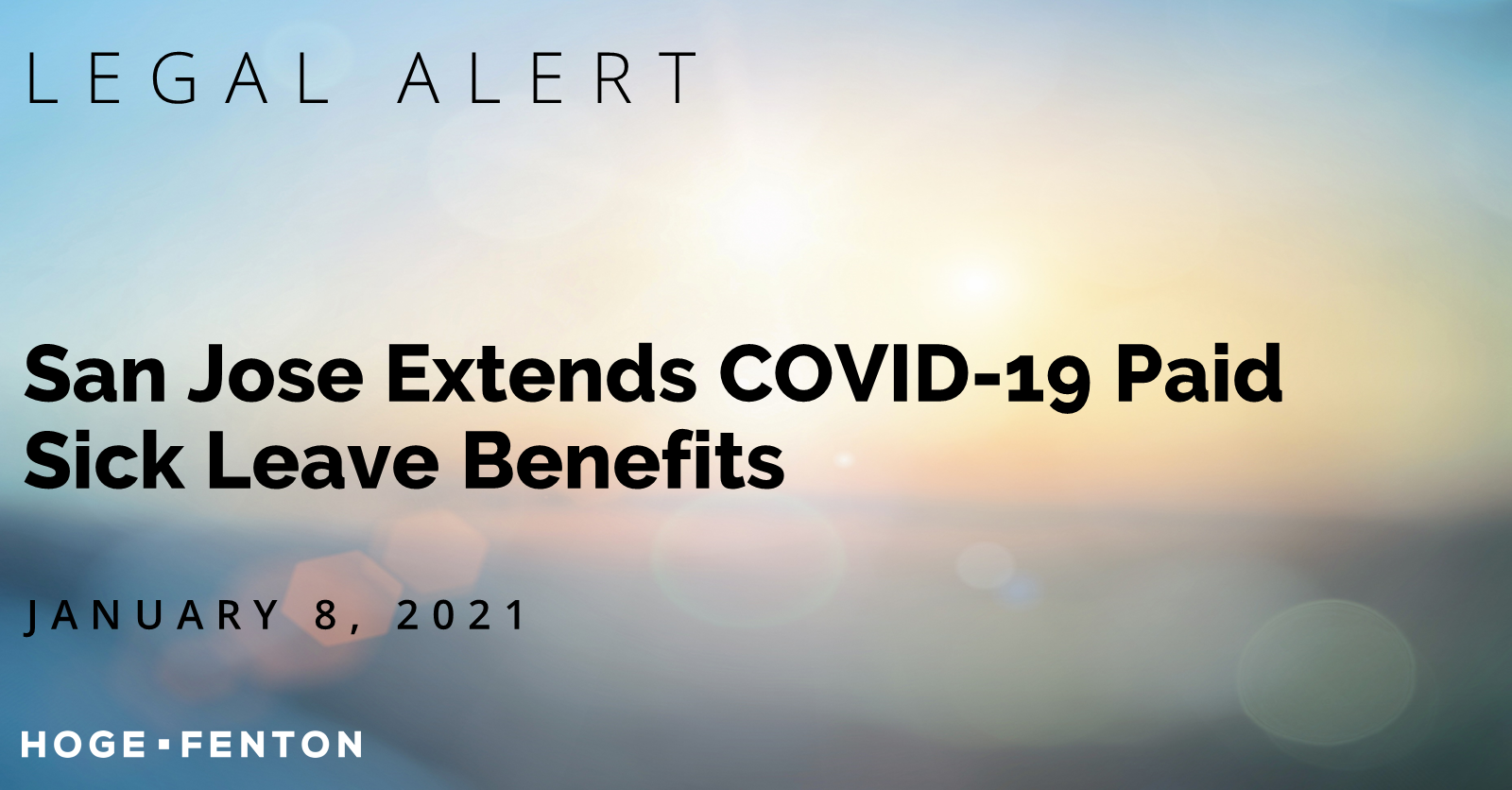San Jose Extends COVID-19 Paid Sick Leave Benefits Through June 30, 2021
By Hoge Fenton | 01.8.2021 | Employment Law

by Sarju Naran, Employment Law Group
On January 5, 2021, the San Jose City Council voted unanimously to extend the timeframe for employers to provide emergency paid sick leave benefits to San Jose employees for qualifying reasons pertaining to COVID-19. Click here for a copy of the new ordinance.
Employers may recall that the San Jose ordinance was first enacted on April 7, 2020, as a way to provide paid sick leave benefits to San Jose employees who were not eligible for federal paid sick leave benefits under the Families First Coronavirus Response Act (FFCRA). Shortly after the San Jose ordinance was enacted, California enacted a similar statewide COVID-19 supplemental paid sick leave for employees who were ineligible for benefits under the FFCRA. However, all three laws (the FFCRA, the California COVID-19 supplemental paid sick leave, and the San Jose ordinance) expired on December 31, 2020, rendering employees without any COVID-19 paid sick leave protections in 2021. With the COVID-19 crisis continuing to persist, the San Jose City Council has now voted to extend paid sick leave benefits for an additional 6 months, and to make the extension retroactive to January 1, 2021.
Key points of the new ordinance:
- All employees who perform at least 2 hours of work within the City of San Jose are eligible for paid sick leave for a qualifying reason, regardless of the company’s employee headcount (i.e., with the FFCRA expired, the ordinance is no longer aimed at companies with more than 500 employees or fewer than 50 employees)
- Qualifying reasons—The employee must be unable to work (i.e. employees who can work remotely are not eligible) for one of the following reasons:
- The employee is subject to a federal, state, or local quarantine or isolation order related to COVID-19
- The employee has been advised by a health care provider to self-quarantine due to concerns related to COVID-19
- The employee is experiencing symptoms of COVID-19 and seeking a medical diagnosis
- The employee is caring for an individual who is either: (1) to a subject federal, state, or local quarantine or isolation order related to COVID-19, or (2) has been advised by a health care provider to self-quarantine due to concerns related to COVID-19
- The employee is caring for a son or daughter of such employee if the school or place of care of the son or daughter has been closed, or the childcare provider of such son or daughter is unavailable, due to COVID-19 precautions
- Full-time employees are eligible for 80 hours of paid sick leave, to be used between April 2, 2020, and June 30, 2021. Part-time employees are eligible for pro-rated leave.
- Employees who take leave for themselves are entitled to their full regular pay, up to a maximum of $511 per day. Employees who take leave to care for another person are entitled to two-thirds of their regular pay, up to a maximum of $200 per day.
- Employees cannot be required to take other available paid time off first (e.g. vacation, PTO) before using paid sick leave under the ordinance.
- However, importantly, the ordinance does not apply to any company that provides paid personal leave that is at least equivalent to the paid sick time required under the ordinance. For example, because the ordinance provides full-time employees with 80 hours of leave between April 2, 2020, and June 30, 2021 (i.e. 15 months), if a company offers its full-time employees a combination of vacation accrual and sick time that equals at least 80 hours of paid time off over the course of 15 months, the company is not required to do anything further to comply with the San Jose ordinance. If a company offers its full-time employees less than 80 hours of paid personal leave over 15 months, the company needs to make up the shortfall with paid sick time under the ordinance (and as stated in the prior bullet point, the employee must be able to use the paid sick time first before using any other form of paid leave).
For more information or resources regarding COVID-related laws applicable to employers please refer to Hoge Fenton’s Employment Law Group’s resource page here, or feel free to contact a member of the Employment Law Group.
Meet Our Employment Law Group
 |
Sarju Naran is a zealous advocate for his clients and approaches litigation with creativity and strategy. Chair of Hoge Fenton’s Employment Law Group, Sarju’s experience spans from representing middle-market and family-owned closely held businesses to large multi-national companies. He regularly litigates and provides advice and counsel to companies on wage and hour issues, trade secret misappropriation, employee mobility, wrongful termination, performance management, and leaves of absence. |
 |
Jenn Protas helps employers navigate California’s numerous employment laws and defends employers with an eye toward successful, yet cost-effective resolution. Jenn is a committed advocate for her clients and a tenacious litigator. She defends employers on matters related to wage and hour law, wrongful termination, harassment, discrimination, and retaliation in single-plaintiff litigation, Private Attorney General Act actions, and/or class actions. Jenn’s practice also includes housing discrimination matters and business litigation. |
 |
Maysa Saeed is an associate attorney whose practice focuses on employment counseling and litigation and assists clients in all aspects of employment law. Prior to joining Hoge Fenton, Maysa was a litigation associate with experience litigating various commercial, employment, and real estate matters. Maysa’s prior legal experience also includes defending insurance carriers in administrative trials before the Workers’ Compensation Appeals Boards in San Jose and Salinas. |
This information is provided as an educational service by Hoge Fenton for clients and friends of the firm. This communique is an overview only, and should not be construed as legal advice or advice to take any specific action. Please be sure to consult a knowledgeable professional with assistance with your particular legal issue. © 2021 Hoge Fenton









